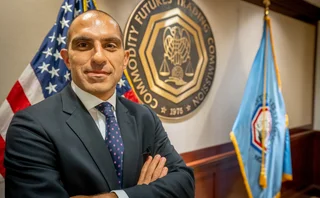
Ex-Countrywide chief faces fraud charges
WASHINGTON, DC - The US Securities and Exchange Commission (SEC) has charged Angelo Mozilo, the former chief executive officer of Countrywide Financial, with securities fraud and insider trading.
Two other ex-Countrywide executives, former chief operating officer and president David Sambol and former chief financial officer Eric Sieracki, have also been charged with securities fraud for deliberately misleading investors about significant credit risks being taken in efforts to build the company's market share. Mozilo was also charged with insider trading for selling his Countrywide stock based on non-public information for almost $140 million in profits.
The SEC's enforcement action alleges that from 2005 through 2007, Countrywide engaged in an expansion of its underwriting guidelines and was writing riskier and riskier loans, which these senior executives were warned might ultimately curtail the company's ability to sell them. Countrywide was required to disclose these important trends to its investors in the management discussion and analysis portion of its SEC filings, but failed to do so.
"This is a tale of two companies," said Robert Khuzami, director of the SEC's enforcement division. "Countrywide portrayed itself as underwriting mainly prime quality mortgages using high underwriting standards. But concealed from shareholders was the true Countrywide, an increasingly reckless lender assuming greater and greater risk. Angelo Mozilo privately described one Countrywide product as 'toxic', and said another's performance was so uncertain that Countrywide was 'flying blind'."
According to the SEC's complaint, filed in federal district court in Los Angeles, Countrywide's annual reports for 2005, 2006 and 2007 misled investors in claiming that Countrywide "manage(d) credit risk through credit policy, underwriting, quality control and surveillance activities". Its annual reports for 2005 and 2006 falsely stated that the company ensured its "access to the secondary mortgage market by consistently producing quality mortgages". The annual report for 2006 also falsely claimed Countrywide had "prudently underwritten" its pay-option adjustable-rate mortgage loans.
The SEC alleges Mozilo, Sambol and Sieracki knew, and acknowledged internally, that Countrywide was writing increasingly risky loans, and that defaults and delinquencies would rise as a result.
Countrywide's 'supermarket' strategy - widening underwriting guidelines to match any product offered by its competitors - led by the end of 2006 to the lender making an increasing number of loans that had a higher rate of default. According to the SEC, Mozilo believed the risk was so high that he repeatedly urged Countrywide sell its entire portfolio of pay-option loans. But despite these concerns about the increasing risks Countrywide was undertaking, Mozilo, Sambol and Sieracki hid these risks from the investing public, says the complaint.
The SEC further alleges that Mozilo engaged in insider trading of Countrywide stock that he owned. Mozilo established four executive stock sale plans for himself in October, November and December 2006 while he was aware of material, non-public information concerning Countrywide's increasing credit risk and the expected poor performance of Countrywide-originated loans. From November 2006 through August 2007, Mozilo exercised more than 5.1 million stock options and sold the underlying shares for total proceeds of almost $140 million, pursuant to written trading plans adopted in late 2006 and early 2007.
The SEC seeks permanent injunctive relief, officer and director bars, and financial penalties against all of the defendants, and the disgorgement of ill-gotten gains with prejudgment interest against Mozilo and Sambol.
Lawyers for the three men said they would defend themselves vigorously against the suit. "The lawsuit filed today by the SEC does not reflect a balanced or fair consideration of the facts or the law," said David Siegel, a lawyer at Irell & Manella who represents Mozilo, to the New York Times. A lawyer for Sambol said the SEC's case was baseless and that it disregarded public statements Sambol made detailing the liberal lending practices at Countrywide. Sieracki's lawyer also said the regulator's case had no merit.
Although the SEC case is a civil prosecution, this does not guarantee that the defendants will not face criminal charges if convicted.
Only users who have a paid subscription or are part of a corporate subscription are able to print or copy content.
To access these options, along with all other subscription benefits, please contact info@risk.net or view our subscription options here: http://subscriptions.risk.net/subscribe
You are currently unable to print this content. Please contact info@risk.net to find out more.
You are currently unable to copy this content. Please contact info@risk.net to find out more.
Copyright Infopro Digital Limited. All rights reserved.
You may share this content using our article tools. Printing this content is for the sole use of the Authorised User (named subscriber), as outlined in our terms and conditions - https://www.infopro-insight.com/terms-conditions/insight-subscriptions/
If you would like to purchase additional rights please email info@risk.net
Copyright Infopro Digital Limited. All rights reserved.
You may share this content using our article tools. Copying this content is for the sole use of the Authorised User (named subscriber), as outlined in our terms and conditions - https://www.infopro-insight.com/terms-conditions/insight-subscriptions/
If you would like to purchase additional rights please email info@risk.net
More on Regulation
FCA presses UK non-banks to put their affairs in order
Greater scrutiny of wind-down plans by regulator could alter capital and liquidity requirements
Industry calls for major rethink of Basel III rules
Isda AGM: Divergence on implementation suggests rules could be flawed, bankers say
Saudi Arabia poised to become clean netting jurisdiction
Isda AGM: Netting regulation awaiting final approvals from regulators
Japanese megabanks shun internal models as FRTB bites
Isda AGM: All in-scope banks opt for standardised approach to market risk; Nomura eyes IMA in 2025
CFTC chair backs easing of G-Sib surcharge in Basel endgame
Isda AGM: Fed’s proposed surcharge changes could hike client clearing cost by 80%
UK investment firms feeling the heat on prudential rules
Signs firms are falling behind FCA’s expectations on wind-down and liquidity risk management
The American way: a stress-test substitute for Basel’s IRRBB?
Bankers divided over new CCAR scenario designed to bridge supervisory gap exposed by SVB failure
Industry warns CFTC against rushing to regulate AI for trading
Vote on workplan pulled amid calls to avoid duplicating rules from other regulatory agencies







